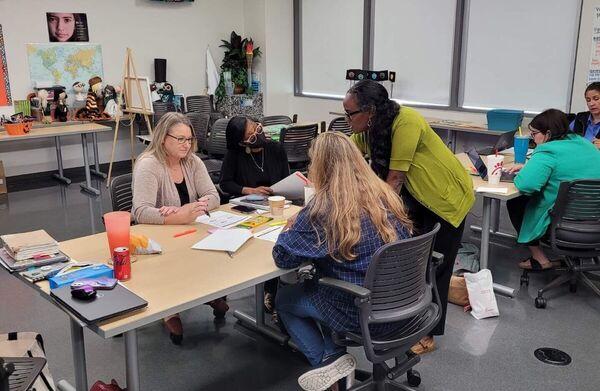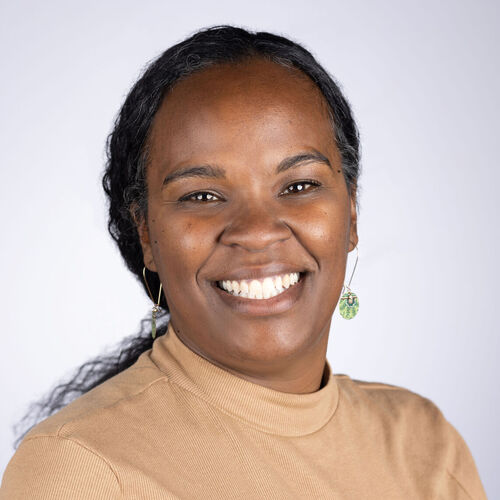Posted on
Coaching teacher candidates: 4 things we learned
If you’re a mentor teacher hosting a student teacher in your classroom – whether for the first time or the 10th time – you might have questions about how to help those pre-service teachers get ready for classrooms of their own. Maybe you’re worried you don’t have enough experience to be an effective coach, or maybe you’re not sure how to set expectations effectively, or maybe you’re nervous about letting go of control.
Those concerns are universal – but different mentor teachers have different ways of handling them, which can lead to inconsistent experiences for teacher-candidates.
The Cato College of Education at UNC Charlotte is tackling this challenge. In the fall of 2016, Deans for Impact member Ellen McIntyre asked us to support her college in designing a Teacher Education Institute (funded by the Belk Foundation) to bring together coursework faculty, student-teaching supervisors, and mentor teachers to build common language to describe teacher-candidate practice and to learn how to coach candidates more effectively and consistently. These different groups of teacher-educators all share some responsibility for observing, coaching, and evaluating teacher-candidates, so aligning around common language and common coaching practices was important to creating a coherent candidate experience.
As we’ve worked with UNC Charlotte over the last year, we’ve learned how these teacher-educators develop respect, trust, and a set of shared expectations. We’ve also seen how teams of teacher educators can improve the consistency of a teacher-candidate’s experience by learning common practices and structures for coaching and feedback.
Here are four lessons that stand out:
- Create systems and structures for coaches to share information about the same candidates. UNC Charlotte has created small support teams for teacher-candidates that include the mentor teacher, a university supervisor, and a faculty member, all of whom share responsibility for the candidate’s learning and growth. By collecting observation data in a shared folder, each team member can quickly review notes from recent coaching sessions and can see what feedback other team members have given to the teacher-candidate. The entire team also meets with the teacher-candidate at two different points in the semester in order to provide common feedback to the candidate. These systems and structures help ensure that teacher-candidates are receiving consistent feedback and that any discrepancies in the feedback are quickly identified.
- Identify a menu of coaching strategies for mentor teachers and other teacher-educators to use because not all coaching strategies work the same way for everybody. For example, in-the-moment coaching strategies such as a “huddle” or “sideline” might work well for a mentor teacher who is with the candidate every day in the classroom. However, for a faculty member who observes the candidate twice per semester, a sequence of meetings – pre-conference, observation, and post-conference – may work better. Whatever the strategy, teacher-educators at UNC Charlotte have to communicate in advance with candidates what they should expect from each member of the support team.
- Narrow the universe of teaching practices on which teacher-educators are coaching a candidate, particularly when teacher-educators are still developing and refining a set of coaching strategies with which they feel comfortable. Our design team made this decision because we know from deliberate practice that both teacher-educators and teacher-candidates learn more when they focus on improving a particular aspect of teaching (or coaching) rather than working toward broad, general improvement.
As part of the design process for the Teacher Education Institute, teacher-educators identified three practices that were important for teacher-candidates to learn: facilitating a whole class discussion; managing small group work; and eliciting student thinking.” Then at the TEI, we spent the first two days watching videos of teacher-candidates and experienced teachers and generating a list of “Look Fors” (e.g. The teacher poses questions to probe, or extend student thinking based on student responses) so that all teacher-educators were normed on what these “focus practices” looked like. While these practices are not the only things teacher-candidates need to know and be able to do, they are the focus for coaching that candidates receive from their support team of teacher-educators.
- Identify and continue to wrestle with the important differences and similarities between coaching and evaluation. Most of the teacher-educators who support and coach candidates in the classroom at UNC Charlotte are also charged with evaluating the candidate at some point in the semester, whether it’s a grade, pass/fail determination, or scores on a rubric of teaching practices. The teacher-educators told us that they wanted to be upfront and honest with candidates about that, even as the teacher-educators struggled with the best way to separate the coaching from the evaluation. We’ll continue to think on this challenge with them.
Related Stories:

Blog
A coach for the coaches
Usually, coaches are the experts at dispensing strategy and advice.
October 05, 2021

Blog
Case Study: Fighting folk pedagogies with science at UNC Charlotte
Imagine you’re observing a third-grade classroom. The teacher has just finished a multiplication..
June 29, 2021

Blog
Empowering clinical supervisors as instructional coaches
We supported clinical supervisors to strengthen coaching and feedback for candidates.
August 15, 2023
